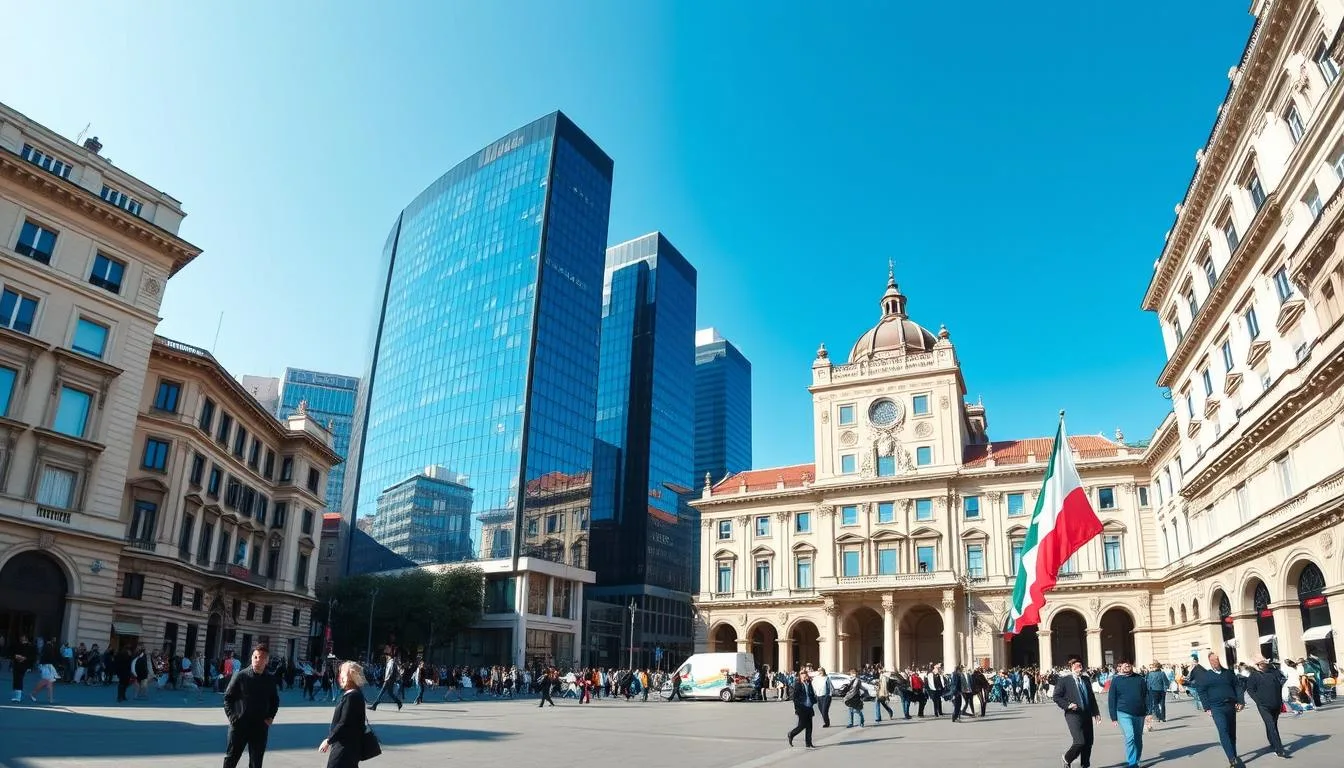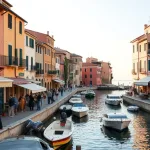Italy stands as one of Europe’s most diverse and opportunity-rich economies, offering British entrepreneurs a unique blend of tradition and innovation. With its strategic Mediterranean location, world-renowned cultural heritage, and specialized regional economies, the country presents distinctive advantages for businesses looking to expand into Southern European markets.
Italy’s Economic Landscape: An Overview
With a GDP of €36,600 per capita and accounting for 12.2% of the EU’s total GDP, Italy represents the eighth-largest economy globally. The country’s economic structure varies significantly by region, with the industrialized north contrasting with the more agriculturally-focused south, creating diverse business opportunities across different sectors.
Italy’s membership in the European Union since 1958 provides businesses with access to the single market, while its adoption of the euro simplifies financial operations for British companies. The country’s economy is characterized by a strong manufacturing base, particularly in high-quality consumer goods, alongside growing technology and service sectors.
“Italy’s economy is marked by a high proportion of small and medium-sized enterprises, with over 4.4 million SMEs accounting for 79% of employment – creating a dynamic environment for new business ventures.”
Key Economic Indicators
| Indicator | Value | EU Ranking |
| Population | 58.99 million (2024) | 3rd |
| GDP Per Capita | €36,600 | 12th |
| Total GDP | 12.2% of EU total | 3rd |
| Business Formation Time | 6-8 weeks average | 14th |
Milan: Financial Powerhouse and Innovation Hub
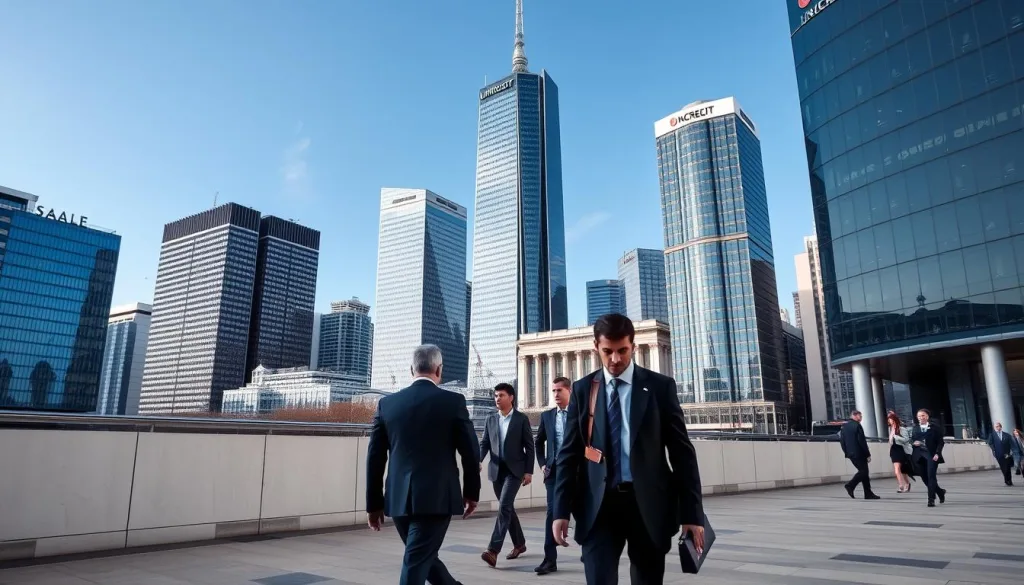
Milan stands as Italy’s undisputed financial centre and economic engine, generating approximately 10% of the country’s GDP. As the capital of Lombardy, Milan combines financial prowess with industrial innovation, making it an ideal location for businesses seeking a foothold in Italy’s most dynamic economic region.
Key Industries and Sectors
- Finance and Banking – Home to the Italian Stock Exchange and headquarters of major banks like UniCredit and Intesa Sanpaolo
- Fashion and Design – Global fashion capital hosting Milan Fashion Week and housing luxury brands like Prada, Armani, and Versace
- Technology and Innovation – Growing tech ecosystem with numerous startups and innovation hubs
- Manufacturing – Specialised in high-end production, particularly in automotive and machinery sectors
Business Infrastructure
Milan boasts exceptional infrastructure that supports business operations. The city is served by three international airports, an extensive public transport network, and high-speed rail connections to major European cities. The metropolitan area hosts numerous business districts, including the ultra-modern Porta Nuova and CityLife developments.
“Milan’s startup scene is booming with over 2,100 innovative startups registered in the metropolitan area, making it Italy’s leading hub for entrepreneurial innovation.”
Real Estate Market
The property market in Milan reflects the city’s economic strength, with average commercial real estate prices ranging from €300-€500 per square metre annually in prime locations. While these rates exceed the national average, they remain competitive compared to other European financial centres like London or Paris.
Explore Milan’s Business Landscape
Discover how Milan’s financial prowess impacts property costs and business opportunities with our comprehensive guide to navigating the city’s dynamic market.
Rome: Historic Capital with Modern Business Potential
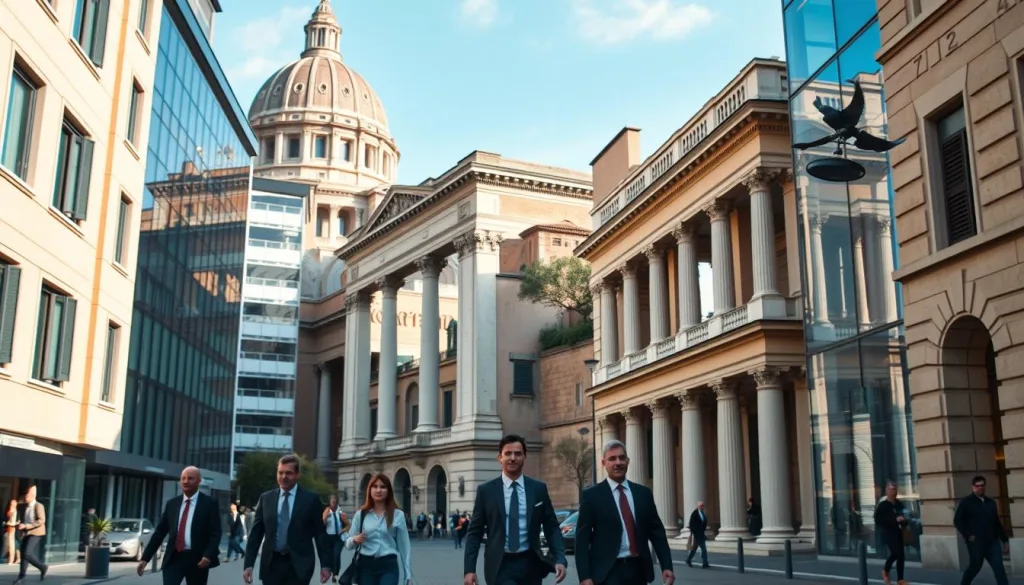
As Italy’s capital and largest city, Rome combines rich historical significance with substantial economic opportunities. The city’s economy is diverse, spanning government administration, tourism, international organisations, and a growing technology sector.
Key Industries and Sectors
- Government and Public Administration – Centre of Italian political and administrative operations
- Tourism and Hospitality – One of the world’s most visited cities, supporting a vast service economy
- International Organisations – Hosts numerous UN agencies, embassies, and multinational headquarters
- Media and Communications – Home to major Italian broadcasting companies and film studios
Business Infrastructure
Rome offers comprehensive business support infrastructure, including the Rome Chamber of Commerce, numerous business incubators, and specialised economic zones. The city is served by two international airports and extensive public transport, though traffic congestion remains a challenge in central areas.
“Rome’s economy generates approximately €73 billion in annual GDP, with the service sector accounting for over 87% of economic activity, creating diverse opportunities for business-to-business services.”
Setting Up a Business in Rome
Establishing a company in Rome offers strategic advantages, including access to government contracts and proximity to decision-makers. The city provides various support services for new businesses, particularly in sectors aligned with local economic priorities such as sustainable tourism, cultural heritage management, and technology.
Discover Business Opportunities in Rome
Learn how to navigate Rome’s historic charm and understand its diverse business landscape with our comprehensive guide to establishing and growing your venture in Italy’s capital.
Bologna: Culinary Excellence and Educational Innovation
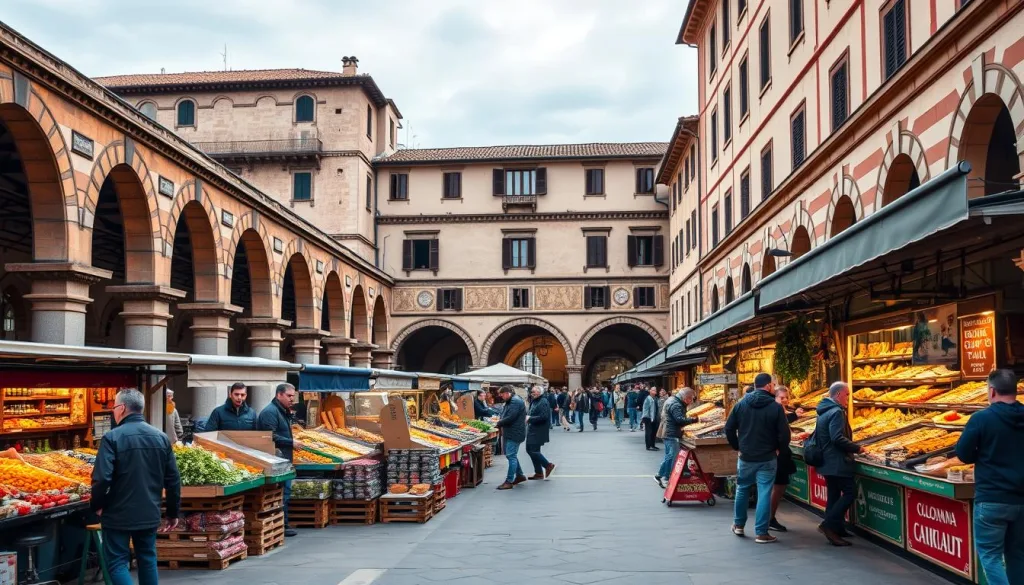
Bologna, capital of the Emilia-Romagna region, offers a distinctive business environment that combines culinary excellence, educational innovation, and manufacturing prowess. The city’s strategic location in northern Italy provides excellent connectivity to major markets while maintaining lower operational costs than Milan or Rome.
Key Industries and Sectors
- Food Production and Culinary Innovation – Centre of Italian food excellence and home to major food processing companies
- Education and Research – Location of the world’s oldest university and numerous research institutions
- Manufacturing – Specialised in precision engineering, automotive components, and packaging machinery
- Healthcare and Biotechnology – Growing hub for medical research and biotechnology startups
Business Infrastructure
Bologna offers excellent support for businesses, including the Bologna Fiere exhibition centre, which hosts international trade shows, and the FICO Eataly World, the world’s largest food park. The city’s compact size makes networking and business relationships particularly accessible.
“Bologna’s food sector generates over €5 billion annually, with more than 1,000 specialised companies forming one of Europe’s most concentrated food production clusters.”
Cost of Living and Business Operations
Operating costs in Bologna are approximately 15-20% lower than in Milan, with commercial rents in central areas ranging from €180-€250 per square metre annually. This cost advantage, combined with the high quality of life, makes Bologna particularly attractive for startups and SMEs.
Tap Into Bologna’s Business Ecosystem
Discover how to leverage Bologna’s culinary excellence and innovative business environment with our detailed guide to establishing and growing your venture in Italy’s gastronomic capital.
Florence: Artistic Heritage and Luxury Craftsmanship
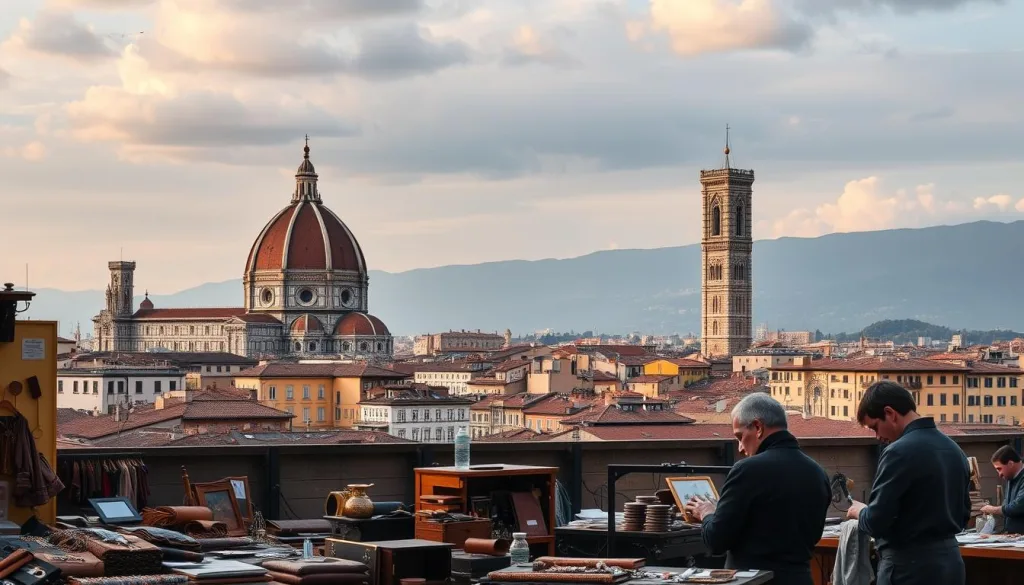
Florence, the capital of Tuscany, offers unique business opportunities centred around its unparalleled artistic heritage and tradition of luxury craftsmanship. The city combines cultural tourism with high-end manufacturing, creating distinctive niches for specialised businesses.
Key Industries and Sectors
- Luxury Goods and Craftsmanship – World-renowned for leather goods, jewellery, and bespoke fashion
- Cultural Tourism – One of Europe’s most visited cities, supporting a vast service economy
- Art Restoration and Conservation – Global leader in preservation technologies and techniques
- Fashion and Design – Home to major fashion houses and the biannual Pitti Immagine trade shows
Business Infrastructure
Florence offers specialised business support through organisations like Artex (Centre for Artistic and Traditional Craftsmanship) and the Florence Chamber of Commerce. The city hosts numerous international events, including Pitti Uomo, one of the world’s most important menswear exhibitions.
“Florence’s artisanal sector comprises over 7,500 workshops and small manufacturers, generating approximately €800 million annually and employing more than 28,000 skilled craftspeople.”
Investment Opportunities
Florence presents distinctive investment opportunities in heritage tourism, luxury retail, and the digitalisation of traditional crafts. The city’s global brand recognition provides businesses with immediate prestige, particularly valuable for luxury and cultural enterprises.
Unlock Florence’s Business Potential
Learn how Florence’s renowned art scene shapes its unique business environment and discover opportunities in luxury craftsmanship and cultural enterprises.
City Comparison: Finding Your Ideal Italian Business Location
| Factor | Milan | Rome | Bologna | Florence |
| Key Business Sectors | Finance, Fashion, Technology | Government, Tourism, Media | Food, Education, Manufacturing | Luxury Crafts, Tourism, Art |
| Commercial Rent (€/m²/year) | 300-500 | 250-400 | 180-250 | 200-350 |
| Startup Ecosystem | Excellent | Good | Very Good | Developing |
| International Connectivity | Excellent | Excellent | Good | Good |
| Business Support Services | Comprehensive | Extensive | Good | Specialised |
| Talent Availability | High | High | Very High | Specialised |
Practical Considerations for UK Businesses

Legal Structure and Company Formation
When establishing a business in Italy, UK entrepreneurs typically choose between several legal structures:
- Società a Responsabilità Limitata (SRL) – Similar to a UK limited company, requiring a minimum capital of €10,000
- Società per Azioni (SpA) – Equivalent to a public limited company, requiring minimum capital of €50,000
- Branch Office – Extension of a foreign company without separate legal personality
- Representative Office – Limited to promotional activities without commercial transactions
Company formation typically takes 6-8 weeks and requires notarised documentation, tax registration, and social security registration. Working with local experts is highly recommended to navigate the process efficiently.
Taxation and Financial Considerations
Italy’s corporate tax rate (IRES) stands at 24%, with an additional regional production tax (IRAP) of approximately 3.9%. The country offers various incentives for new businesses, including:
- Research and development tax credits of up to 50% of qualifying expenditure
- Patent box regime offering reduced taxation on intellectual property income
- Regional incentives for investments in economically disadvantaged areas
- Special provisions for innovative startups, including simplified incorporation
Cultural Business Practices
Success in the Italian market often depends on understanding local business culture:
- Relationship-building is paramount, with face-to-face meetings highly valued
- Business hierarchies tend to be respected, with decision-making often centralised
- Punctuality is expected for meetings, though negotiations may proceed at a measured pace
- English proficiency varies, with higher levels in multinational companies and northern regions
Conclusion: Your Path to Italian Business Success
Italy offers British businesses a diverse range of opportunities across its distinctive regional economies. Whether you’re drawn to Milan’s financial dynamism, Rome’s institutional connections, Bologna’s culinary innovation, or Florence’s luxury craftsmanship, each city presents unique advantages for specific business models and sectors.
Success in the Italian market requires careful consideration of location, legal structure, and cultural factors. By leveraging local expertise and building strong relationships, UK businesses can effectively tap into Italy’s sophisticated consumer market of nearly 60 million people and access wider Mediterranean opportunities.
Ready to Explore Business Opportunities in Italy?
Discover our comprehensive guide to 50 business ideas to start in Italy, from traditional ventures to innovative startups across tourism, food, fashion, and technology sectors.

